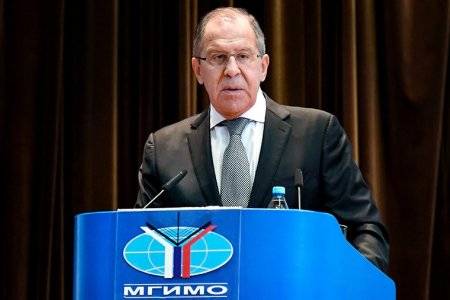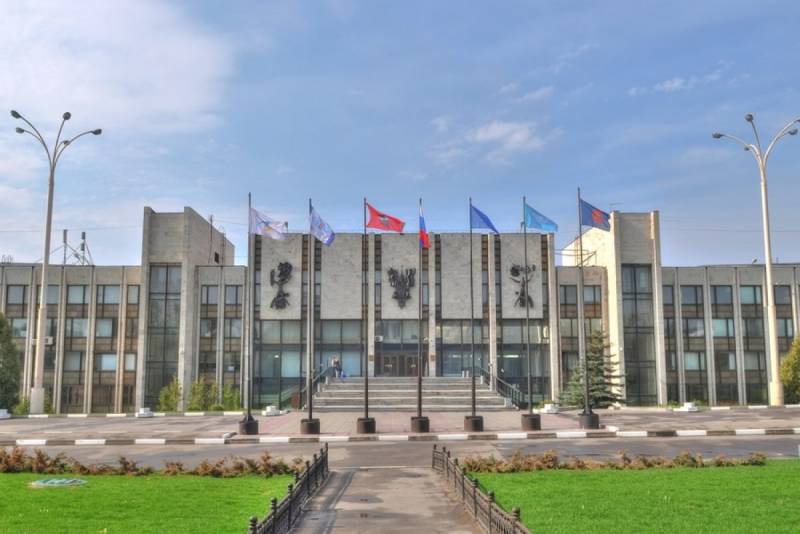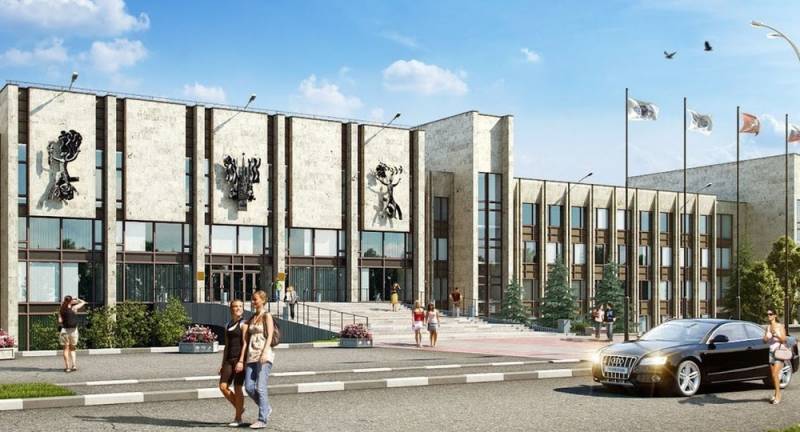MGIMO - 75 years
How was MGIMO created
The creation of a whole higher education institution that trained specialists in international relations and provided for the personnel requirements of the Soviet diplomatic department was not an accident. Foreign policy contacts of the Soviet Union grew, which made it necessary to train an increasing number of specialists. Earlier, diplomatic cadres were trained at the international faculty of Moscow State University, but over time it became clear that one faculty would not cover the needs of the People's Commissariat of Foreign Affairs of the USSR, a whole separate institute was needed.
14 October 1944 year, by the Decree of the Council of People's Commissars of the USSR, the international faculty of M.V. Lomonosov was transformed into an independent institution of higher education - the Moscow State Institute of International Relations. In the first set of the new university there were 200 students, including five Heroes of the Soviet Union, many participants in the war.
In 1948, two faculties were formed as part of the institute - international legal and historical-international, and in 1949, an economic faculty was created (from 1950 of the year - international economic). In the same 1950, MGIMO began training specialists in simultaneous translation and international journalists on electives of the historical and international faculty.
In 1954, the Moscow Institute of Oriental Studies became a part of MGIMO, which significantly expanded the range of countries and languages studied at the university. In 1958, the Institute of Foreign Trade of the USSR Ministry of Foreign Trade was integrated into the university, which made it possible to train specialists in foreign economic relations and foreign trade for Soviet departments.
For a while, MGIMO included the 2 faculty - western and eastern, in the directions of Soviet foreign policy. However, then it was decided to return to a different model for organizing the structure of the institute. In 1959, the reorganization of the university took place. The faculties of international relations and international economic relations were distinguished, and after 10 years, in 1969, the faculty of international journalism and the faculty of international law appeared.
Reasons for prestige MGIMO
In Soviet times, especially in the 1960-1980-e years, MGIMO was the most prestigious institution of higher education in the country. Education at MGIMO was considered unequivocal evidence of belonging to the Soviet elite - present or future. The diplomatic service is prestigious in any country in the world, but in the Soviet Union its prestige was simply unbelievable, which was explained by the special attitude of Soviet citizens to any activity related to foreign countries and foreign countries.
Studying at MGIMO made it possible to get a job with business trips abroad, which, under the conditions of the Iron Curtain, immediately raised such a person above all other citizens. Employees of embassies and consulates, trade organizations, international journalists for years lived abroad, receiving not only large salaries, but also touching life unknown to most Soviet citizens, gaining access to goods that were in absolute deficit in the Soviet Union.
At MGIMO, almost the entire Soviet elite sought to give their children after Moscow special schools. MGIMO student - this was already a status in itself, which most often testified to the fact that parents also have status positions: children of diplomats and generals, professors and party officials entered the institute.
For example, MGIMO graduated from the grandson of Leonid Ilyich Brezhnev Andrei Y. Brezhnev (1983, Faculty of International Economic Relations). The son and grandson of the Soviet Foreign Minister Andrei Andreevich Gromyko studied at MGIMO. The son, Anatoly Andreyevich Gromyko, became a prominent Soviet diplomat, specialist in American studies and African studies, and a corresponding member of the USSR Academy of Sciences. Grandson, Igor Anatolyevich Gromyko - diplomat, Ambassador Extraordinary and Plenipotentiary of Russia to Mali and Niger.
Ksenia Sobchak studied at MGIMO (she graduated from the magistracy of the faculty of international relations in 2004), daughter of Nikita Mikhalkov Nadezhda Mikhalkova (2008, faculty of international journalism), granddaughter of the Soviet director Tigran Keosayan Laura Keosayan (faculty of international economic relations) and many other children of famous parents. MGIMO graduated from the son of the Prime Minister of the Russian Federation Dmitry Medvedev, Ilya Dmitrievich Medvedev.
Studying at MGIMO meant a 100% guarantee of employment in the diplomatic department, trade organizations, large print media, and USSR state security agencies. That is, studying at this institute was not just a ticket to life, but a ticket to "real life." After all, the graduates were distributed not to regional centers or villages, but abroad, or at least to Moscow: to the Ministry of Foreign Affairs, the KGB, the State Television and Radio, major Soviet newspapers, and foreign trade organizations.
Nevertheless, the children of ordinary Soviet citizens could also have entered the institute, albeit making incredible efforts to pass entrance exams and receive recommendations. Until 1991, admission to MGIMO and its graduation were one of the many options for vertical social mobility, the channels of which in the Soviet Union were still much more open than in our time.
Forge frame
MGIMO played the main role in the preparation of Soviet diplomats. He can be called a real forge of cadres of the Soviet, and then the Russian diplomatic service. Do not count the diplomats and politicians educated at the Moscow State Institute of International Relations.
 The most famous graduates of MGIMO today are the Minister of Foreign Affairs of the Russian Federation Sergey Lavrov (he graduated from the eastern branch in 1972), the head of the presidential administration Anton Vaino (in 1996 he graduated from the faculty of international relations), the Minister of Culture of the Russian Federation Vladimir Medinsky (in 1992 he graduated Faculty of International Journalism), businessmen Vladimir Potanin (graduated from the Faculty of International Economic Relations in 1983), Alisher Usmanov (1976, international law), diplomats and politicians Aleksey Pushkov, Konstantin Kosachev, Vitaly Churkin (now deceased), former Russian Foreign Minister Andrei Kozyrev and many others.
The most famous graduates of MGIMO today are the Minister of Foreign Affairs of the Russian Federation Sergey Lavrov (he graduated from the eastern branch in 1972), the head of the presidential administration Anton Vaino (in 1996 he graduated from the faculty of international relations), the Minister of Culture of the Russian Federation Vladimir Medinsky (in 1992 he graduated Faculty of International Journalism), businessmen Vladimir Potanin (graduated from the Faculty of International Economic Relations in 1983), Alisher Usmanov (1976, international law), diplomats and politicians Aleksey Pushkov, Konstantin Kosachev, Vitaly Churkin (now deceased), former Russian Foreign Minister Andrei Kozyrev and many others.MGIMO studied the majority of Russian diplomats of various ranks - from ordinary specialists of embassies and consulates to the heads of the Ministry of Foreign Affairs, extraordinary and plenipotentiary ambassadors and representatives. In addition, MGIMO graduates served and continue to serve in foreign intelligence agencies (the KGB of the USSR, then the Foreign Intelligence Service of the Russian Federation), in administrative structures of various levels. There are many MGIMO graduates among top-ranking journalists.
MGIMO in post-Soviet Russia
After the collapse of the USSR, the institute remained at the top of Russian universities. Already in the 1990 years, new specialties appeared here: the faculty of international business and business administration, the faculty of political science were opened, in 2011 the faculty of applied economics and commerce was opened. In 2017, the faculties of public administration and political science were merged into the faculty of management and politics. Thus, MGIMO reacted to changes in the needs of the labor market, which increased interest in specialists in the economic and financial fields.
Currently, MGIMO's structure includes faculties of international relations, international legal, international economic relations, international journalism, international business and business administration, management and politics, applied economics and commerce, financial economics, linguistics and intercultural communication, the International Institute for Energy Policy and Diplomacy, Institute of International Relations and Management, School of Business and International Competencies, Department of Pre-University Training, Military th training center.
The MGIMO Military Training Center provides training for officers - military translators from English, French, German, Chinese, Arabic, Spanish and Portuguese. Many graduates of the Military Training Center subsequently performed important tasks as military translators in the Armed Forces of the Russian Federation, special services and departments.
The collapse of the Soviet Union and the country's transition to a market economy led to the inevitable commercialization of the education system. The Moscow State Institute of International Relations was no exception. There was an opportunity to get education in this educational institution on a commercial basis.
If in Soviet times, for studying at MGIMO, either the exceptional abilities of the applicant or high-ranking parents were needed, now it’s enough to have the funds necessary to pay for studies and the costs associated with it. True, by Russian standards, commercial studies at MGIMO are very expensive. So, according to documents published on the official website of the university, the cost of a bachelor's program in the specialty "Diplomacy and Politics of Foreign Countries" is 2 million 435 thousand rubles, in the specialty "International Relations" - 2 million 277 thousand rubles, etc. .
It is clear that for an average Russian family this is an unbearable amount of money. Yes, and it should be borne in mind that, unlike the Soviet era, today the graduation of the institute of international relations is not a direct and one hundred percent guarantee of employment in the diplomatic service or in other state structures.
However, even now MGIMO continues to provide quality education to those who really want to study, learn a profession, and learn foreign languages. By the way, the study of foreign languages at the institute is carried out at a very high level, and not only European and main Eastern languages are studied, but also many "exotic" languages of the countries of Africa and Asia - Amharic and Bengali, Lao and Swahili, Indonesian and Thai and so on. By the number of languages studied (and there are more than fifty), the Moscow State Institute of International Relations was listed in the Guinness Book of Records.
MGIMO is still responsible for training. Therefore, MGIMO graduates are in demand both in the public service and in commercial organizations. True, university graduates now have to look for work on their own, but the vast majority of masters and bachelors still get jobs without any problems if not in state structures, then in corporations and private companies.


Information